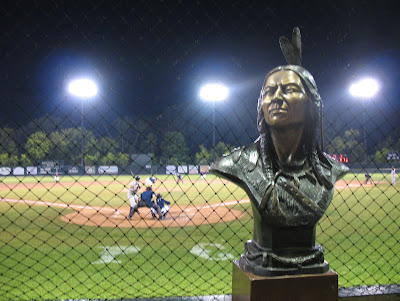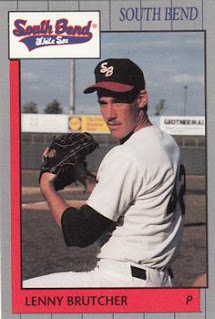Interview Part 1: Rob Leary, Great Decision
 |
| Marlins catcher John Buck behind the plate at Sun Life Stadium in 2011. Rob Leary is now coaching Marlins catchers in 2014 as Miami's major league bench coach. (G21D Photo) |
Part 3: Fortunate Man
Note: Special thanks to former Marlins minor league coach Randy Hennis for making this interview with 2014 Miami Marlins bench coach Rob Leary possible.
It came in spring 1990 and the message was a tough one to hear: The Expos didn't see Leary as a major league player.
What the team saw him as was a coach.
"I thought about it for a few days and I decided to take the position," Leary recalled recently. "As much as I still believed in my abilities (as a player), I think it was a great decision for me."
With that decision, Leary put aside his original goal of making the majors as a player. But that decision also put him on course to make to the majors all the same, just in a different capacity.
After years serving in multiple capacities in the minors, Leary finally made it to the majors in 2010 as an assistant coach with the Red Sox. And he's still in the majors in 2014, serving as bench coach for the Miami Marlins under manager Mike Redmond.
 |
| Sun Life Stadium in Miami Gardens, Fla., before a game in 2011. Rob Leary helped Marlins minor leaguers make it to Miami in the late 1990s. (G21D Photo) |
He spoke about his beginnings in the game as a youth south of San Francisco, working his way up through college and then into the pros. He also spoke of his turn to coaching, and his eventual arrival in the bigs.
Leary grew up in San Carlos City, Ca., about five miles south of San Mateo. He came from an athletic family. His two brothers played baseball, his two sisters played softball. His father Bob coached locally.
When Leary was old enough, he was a bat boy for his father's team. He played in Little League and the local Catholic school league. He also played basketball and some football.
"I don't know how my parents did it all the time, getting all five of us to our activities," Leary said. "But they did a great job of helping us, supporting us and giving us the opportunity to play."
 |
| Marlins Park under construction in 2011. Rob Leary now works at Marlins park as Miami's bench coach. (G21D Photo) |
Leary recalled drawing some inspiration from getting to meet and know a major league player in Bobby Bonds.
As for becoming a professional player, and even a major league player, himself, Leary said it was something he thought about.
"I certainly dreamed about it, but I also knew it would be a lot of hard work to be able to achieve it," Leary said.
Leary graduated from Serra High School in San Mateo, then went to college locally at the College of San Mateo. It was during his freshman year that he started to get the attention of scouts.
 |
| Rosenblatt Stadium in Omaha in 2010. Leary played at Rosenblatt in 1986 with LSU at the College World Series. (G21D Photo) |
If they'd made a strong offer, he might have signed, he recalled. But he believed it was best for him to stay in school and continue playing there.
"Physically I don't think I was strong enough," Leary said. "I thought that I needed a lot more work and a lot more playing time and experience in college before I was ready to go out and try to play professional baseball."
His education was also important to him and is family.
From San Mateo, Leary moved on to Louisiana State University, getting an opportunity to win the starting job right away with a full scholarship. In 1986, Leary helped the team to its first of many College World Series appearances.
 |
| Omaha's Rosenblatt Stadium in 2010. It was in Omaha, during the 1986 College World Series, that Rob Leary learned he'd been drafted by the Expos and where he signed. (G21D Photo) |
"I was thrilled, I was extremely happy," Leary said of getting drafted.
He was also taken by a club whose scouting director was a man he now considers a lifelong friend, Gary Hughes. Hughes had even went to the same high school as Leary did.
Leary's mother was at the College World Series with him. Once LSU got eliminated, their attention turned to the Expos.
"The next morning, I sat down with the Expos, with my mother, and we came to an agreement on a contract," Leary recalled. "I get to go home for a week and then I started out my professional baseball career."
Part 1: Great Decision | Part 2: His Potential
Part 3: Fortunate Man
Go to Part 2: Rob Leary, His Potential







